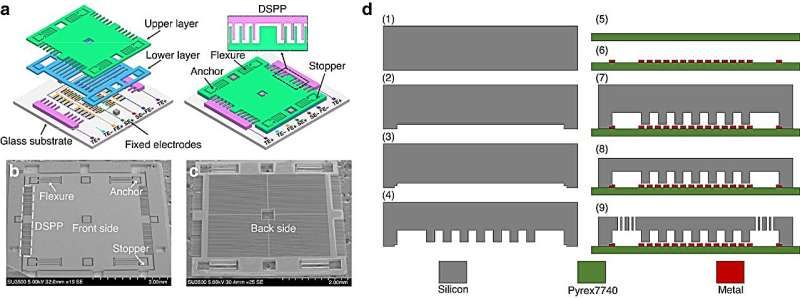This article has been reviewed according to Science X's editorial process and policies. Editors have highlighted the following attributes while ensuring the content's credibility:
fact-checked
peer-reviewed publication
proofread
MEMS accelerometer based on stiffness tuning for improved motion detection technology

MEMS accelerometers, essential for various high-tech applications, face challenges with temperature-induced accuracy drifts. Despite their widespread use in electronics, navigation, and monitoring systems, their performance is compromised by temperature effects on mechanical and electronic components, leading to inaccuracies.
Traditional solutions involve designing temperature-insensitive structures and improving manufacturing processes, but these have limited success.
A recent study led by a team of experts from Zhejiang University, published on January 18, 2024, in the journal Microsystems & Nanoengineering, has introduced an innovative MEMS accelerometer based on stiffness tuning with enhanced precision and stability. This device, notable for its self-centering and stiffness control capabilities, represents a significant advance in accelerometer technology.
The study showcases a MEMS accelerometer equipped with a novel dual closed-loop system, integrating DC/AC electrostatic tuning for effective stiffness adjustment and geometric offset calibration. This system counters the common problem of temperature drift, improving the device's precision and reliability.
The accelerometer's design employs a self-centering closed-loop for accurately determining the optimal reference position and a stiffness closed-loop to maintain effective stiffness despite temperature variations. Real-time adjustments of the reference position and tuning voltage enable the compensation of residual temperature drift, achieving a temperature drift coefficient of approximately 7 μg/°C and an Allan bias instability of less than 1 μg.
Lead researcher, Dr. Zhipeng Ma, states, "Our study marks a substantial step forward in MEMS technology, offering remarkable improvements in both precision and temperature stability for a quasi-zero stiffness-based instrumentation of acceleration."
This innovation not only addresses longstanding challenges of temperature drift but also paves the way for more reliable and accurate applications in critical areas like space exploration and environmental monitoring, promising to revolutionize high-precision measurement and control systems.
More information: Yiming Jin et al, A self-centering and stiffness-controlled MEMS accelerometer, Microsystems & Nanoengineering (2024). DOI: 10.1038/s41378-023-00647-4



















